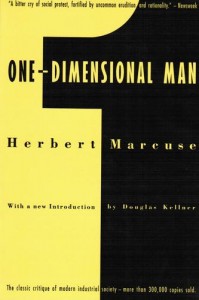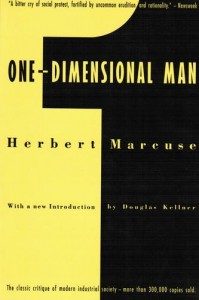
One-Dimensional Man turns 50
 Herbert Marcuse’s (1898-1979) best-known book One-Dimensional Man was first published 50 years ago in 1964 by Beacon Press. If we are to follow Douglas Kellner’s assertion in his Introduction to the Second Edition from 1991, it was ‘one of the most important books of the 1960s’ (Kellner 1991: xi), a decade giving rise to the movements and counter-cultures of the New Left.
Herbert Marcuse’s (1898-1979) best-known book One-Dimensional Man was first published 50 years ago in 1964 by Beacon Press. If we are to follow Douglas Kellner’s assertion in his Introduction to the Second Edition from 1991, it was ‘one of the most important books of the 1960s’ (Kellner 1991: xi), a decade giving rise to the movements and counter-cultures of the New Left.
If this was so, how come that in the varied literature on social movements – both contemporary and contemporaneous – it has rarely been discussed at length? Flicking through some of the standard introductory textbooks on social movement theory (SMT), Marcuse is conspicuously absent from the indices and reference lists.
Perhaps the sub-field of SMT has imposed disciplinary restrictions that are waiting to be transcended. The following quote from a recent book on European SMT points to an established orthodoxy that prevents the radical scholarship around New Left politics from entering the international discussions on the subject:
‘…the uncritical repetition of a reductionist account of ‘European social movement theory’ bears no resemblance to the social theorists and processes of movement theorising we encounter within movements and in European writing on movements.’ (Flesher Fominaya and Cox 2013: 8)
Where Herbert Marcuse does appear he is usually thrown into the camp of new social movement (NSM) scholars, alongside the likes of Offe, Habermas, Touraine or Melucci. Yet, there is a problem here: while NSM writers refer to a post-industrial (Touraine) or information (Melucci) society, Marcuse’s analysis in One-Dimensional Man remains firmly wedded to a more traditional Marxist view of ‘advanced industrial society’. A second glance thus reveals a more materialist (if un-orthodox) vocabulary, with the party-form, anti-imperialism and false consumer consciousness as central themes amidst a ‘society without opposition.’
Beyond the textbooks, however, Douglas Kellner is not alone in asserting that Marcuse’s theories of liberation and revolution had inspired a generation of students not only in Germany but also in the US and elsewhere. If we want to understand a period of progressive radicalism in the 1960s, especially that taking root on American campuses, Marcuse captures much of it. More importantly, Marcuse’s work and One-Dimensional Man in particular can help us understand social protest today. For example, a recent conference and special issue of the Radical Philosophy Review tried to link, rather successfully it seems, Marcuse to the Occupy movement (Radical Philosophy Review 2013).
At second thought however, this appears to be an absurd claim to make. Surely, the object of this classic critique of ‘advanced industrial society’ is too tightly connected to a historical situation where the capitalist world looked towards full employment, welfare and a growing leisure industry while the communist countries were industrialising at a rapid speed. Both processes, for Marcuse, signified the predominance of an increasingly totalitarian state. Today, the persistence of the neoliberal attack on welfare systems in core capitalist countries, alongside the lack of a real-existing alternative to consumer capitalism, appears to set very different historical parameters.
Can we re-capture the spirit of One Dimensional Man for our times? And should we locate it as a milestone in the literature on movements and revolutions? I would like to hear from those who are using Marcuse today.
References
Flesher Fominaya, C. and Cox, L. 2013. Understanding European Movements: New Social Movements, Global Justice Struggles, Anti-Austerity Protest. Abingdon: Routledge.
Kellner, D. 1991. ‘Introduction.’ In: Marcuse, H. One-Dimensional Man: Studies in the Ideology of Advanced Industrial Society. Second Edition. Boston: Beacon Press, pp. xi–xxxix.
Radical Philosophy Review. 2013. Critical Refusals. Volume 16, Issue 2. Available from the Philosophy Documentation Centre.
 Raphael Schlembach
Raphael Schlembach
Raphael Schlembach is a lecturer in criminology at the University of Brighton. He received his PhD from the University of Manchester in 2010, where he was supervised by Nick Crossley and Nick Thoburn. His primary research interests are in social movement theory, European movements, and the policing of protest.





0 Comments